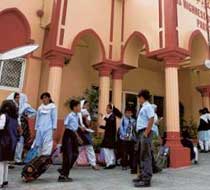
Poor expat kids miss out on education in Bahrain
Manama, January 4, 2014
Hundreds of foreign schoolchildren are allegedly missing out on a proper education in Bahrain because their parents can't afford to send them to school, said a report.
The Pakistani Women's Association (PWA) says low salaries on offer for many expatriates make it impossible for them to afford private school fees.
They do not send their children to free government schools because they cannot speak Arabic, the language of the national curriculum, explained PWA chairwoman Saadia Sharaf.
She said some could only afford to send one child to school and in families with multiple children, normally the girls missed out.
The PWA raises money to support low-income families and one of its goals for 2014 is to help around 100 children go to school for at least two years.
However, Sharaf said there could be many more in this situation from countries such as Pakistan, India, Bangladesh and the Philippines.
"It is a big problem," she told the Gulf Daily News, our sister publication.
"These children really struggle to learn in a government school, where language and cultural difference exist and the curricula are not international.
"Very few can understand Arabic, especially when first arriving, so to get a decent education these children must attend a school where classes are spoken in their own language.
"But we are seeing so many cases where parents just can't pay the school fees, which are between BD250 and BD500 ($660 and $1320) a year.
"Some of these families are surviving on BD150 or below a month, from which they have to pay rent and look after several children.
"If they can afford to send one of their children to school it is usually a son so we try to help the girls as much as possible.
"Some of those we have helped have then gone on to study medicine and become doctors, but it is terrible to think that so many children are not getting that chance.
"Not only is this very bad for them, it is not good for society as a whole as it becomes a social problem," she stated.
"These children are just staying home and have nothing to do all day," remarked Sharaf
Pakistani father Sher Ali has six children aged between two and 18.
He says he struggles to pay for five of his children to attend school on his monthly salary of BD300 and worries they might not all be able to finish their educations.
"I have a big family and a small salary so paying for them all to go to school is almost impossible," he said.
"I can only do so much and with everything else we have to pay for, I worry we cannot pay for them all to go to school."
Temoor Ahsan, 21, says his mother struggled to send him and his four brothers to school after his father, a policeman, died on duty when his youngest child was four years old.
"I was able to get a grant from the school to pay for my tuition if my grades were above 80 per cent at the end of each school year, but I had a friend whose grades were lower and he had to leave school at 15 because his parents couldn't afford to pay," he said.
"The main problem is that our family have not been granted Bahraini citizenship, so we have to pay for all our medical and educational costs and since my mum was widowed it has been very hard for us."
Ahsan is currently in his third year at Bahrain University studying for a degree in mechanical engineering, which he pays for by teaching at the university and with support from his mother who sells homemade goods.
An Education Ministry spokeswoman told the GDN that education was compulsory for all children in Bahrain and said expat children were welcome to attend free government schools.
"Children's education based on the Constitution in Bahrain is compulsory and free of charge and provided by the state to citizens," she said.
"The Education Ministry allows children of expatriates to pursue their basic education in public schools and to enrol freely pending vacancies, especially children whose parents are employees at ministries or in government departments.
"Children of parents working in other categories have the option of enrolling at private schools which provide suitable learning programmes and most often fees are nominal taking into account the financial status of low income families.
"The Education Ministry also has night and specialised classes for non-Arabic speakers."
The PWA is now appealing for individuals and organisations to donate to its education fund, which will allow it to support even more children from low-income families.-TradeArabia News Service







